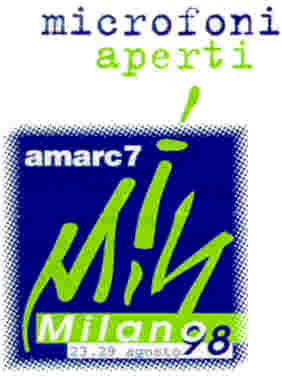amarc-3
[Date Prev][Date Next][Thread Prev][Thread Next][Date Index][Thread Index]
<amarc-3> Discussion Questions
Dear Colleagues.
Thanks for the introductions and interesting comments I've seen from
some of you.
As a quick introduction, my name is Lynne Muthoni Wanyeki and I work on
the community media programme of a regional development communications
and information NGO called EcoNews Africa, which is based in Nairobi,
Kenya. The community media programme aims to assist African CBOs (and
NGOs) in developing participatory communications and information
structures to enable local debate as well community input into
national/international negotiating processes on development (broadly
defined).
Looking through Elvira's questions and all your feedback, several things
come to mind, some of which would seem to be obvious, but aren't:
Certainly in east Africa, debate has focused almost exclusively on the
market economic aspects of telecommunications deregulation ie. the need
to privatize on the assumption that the end of state monopolies over
telecommunications will necessarily bring in investment capital and high
technological inputs and that increased competition will necessarily
allow for universal access to be achieved. Telecommunications is seen
as just one element of a much wider privatization process and concerns
raised are therefore almost solely based on the assumptions inherent in
the `democracy equals political pluralism plus a market economy'
equation.
We have to address, first and foremost, the assumptions of that equation
and the expectations its acceptance has created. Technology is seen as
unchangingly good and the international technological environment as
something we must uncritically and unhesitatingly jump right into as
fast as we can to catch up with everyone else. This catch-up mentality
is what I think we tend to take for granted. Before we can begin to
talk about ensuring civil society's interests are taken on board, we
need to address the fact that civil society believes their interests are
already on board because civil society has been behind the struggles for
the democratic equation.
I am speaking here from our experience in lobbying for the cultural and
social issues in the privatization process of our own PTC and our new
communications act. Lobbying our parliamentarians are almost easy
compared to attempting to find common ground among ourselves as diverse
private sector and non-profit sector stakeholders, especially last year
when we first came together to deal with the first draft of the new
bill.
Apart from critical perspectives (based on common sense, researched
facts and viable alternative options) on the above (information,
information, information) and avoiding the trap of thinking all elements
of civil society everywhere in the world have the same concerns about
convergence, we need to be very practical. It has certainly taken me a
long time to even grasp what convergence meant, let alone what its
implications, positive or negative, are. It's difficult to plan ahead
for something one has not seen and cannot imagine. It's hard to
conceive of dangers when the possibilities appear so dazzling and one
simply wants access and as soon as possible.
Again, we have to go back to basics. What are the possibilities posed
by convergence? What are the assumptions behind those possibilities?
Are they assumptions we believe in? What beyond the technology is
needed to achieve those possibilities? Can and have alternative methods
to achieve those possibilities been already explored? Again, these are
questions relating to what kind of information is available and how its
presented. If we're accepting solutions, let's make sure they are
solutions to our own questions.
To sum up, I think the basics must be spelt out again and again and
again. The draft declaration must be phrased in a manner so as to
address these basics. For civil society to represent its (our)
interests, it must have information that gives it a sense of informed
choice. For cultural and social issues to be considered by civil
society in its representation, it must first ask whether cultural and
social issues are indeed why debate about convergence is occuring or
whether the debate is arising from other assumptions and concerns
altogether.
I hope this isn't too convoluted to be understood. And I'll take note
of the summary's admonition to address ourselves to specific points in
my next submission (smile).
Regards to all.
Lynne Muthoni Wanyeki
Programme Officer, Community Media
EcoNews Africa
++++++++++++++++++++++++++++++++++
AMARC 7 Foro Virtual Forum Virtuel
http://www.amarc.org/amarc7
to unsubscribe / pour se desabonner / para abandonar :
e-mail "unsubscribe amarc-3 " to: [email protected]
Tecnical realisation, scripting and archiving: Worldcom
Foundation
English: [Virtual
Forum Index] [Search
Forum archives]
Français: [Index
du Forum Virtuel] [Chercher
dans les archives du Forum]
Español: [Índice
del Foro Virtual] [Buscar
en los archivos del Foro]
